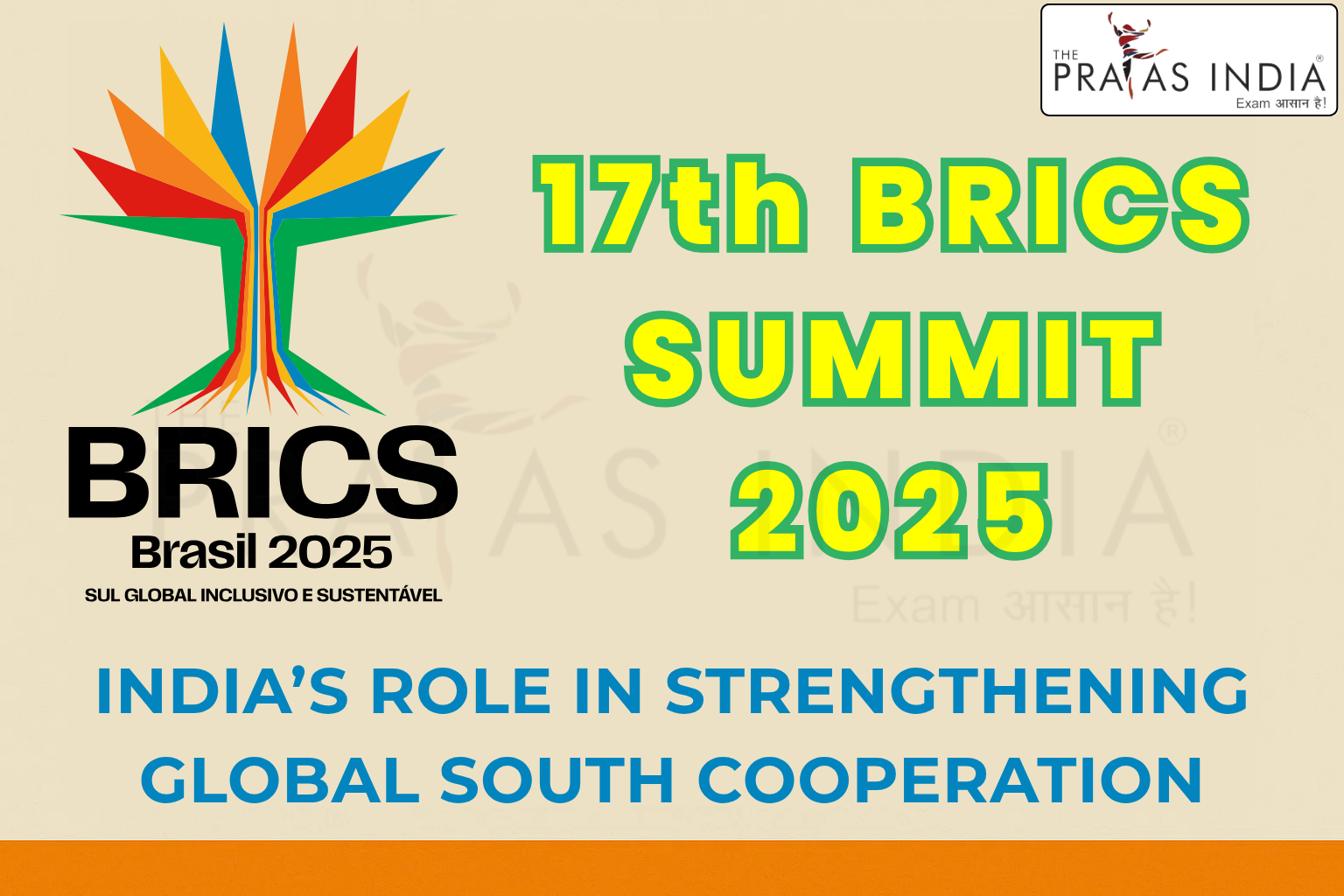17th BRICS Summit 2025: India’s Role in Strengthening Global South Cooperation
Introduction
The 17th BRICS Summit is scheduled to take place on 6–7 July 2025, in Rio de Janeiro, Brazil, under the presidency of Brazilian President Luiz Inácio Lula da Silva. The theme for the summit is “Strengthening Global South Cooperation for More Inclusive and Sustainable Governance.” The summit comes at a critical time when the global geopolitical order is shifting, and the BRICS alliance is expanding to include new member states.
The 2025 summit is expected to reinforce the BRICS agenda of promoting multipolarity, reforming global institutions, and enabling south-south economic, technological, and political cooperation.

What Is BRICS?
BRICS is a grouping of five major emerging economies—Brazil, Russia, India, China, and South Africa—originally formed as BRIC in 2006. South Africa joined in 2010. Since 2023–24, BRICS has undergone a major expansion, adding Egypt, Ethiopia, Iran, and the United Arab Emirates (UAE) as full members, turning it into a powerful voice for the Global South. BRICS now represents over 40% of the global population and approximately 28% of global GDP.
India’s Participation in the Summit
Prime Minister Narendra Modi is set to attend the BRICS summit in Brazil from 5 to 8 July 2025. India is expected to highlight several priority areas, including:
-
Digital Public Infrastructure (DPI) and financial inclusion
-
Climate action and sustainable development
-
Counter-terrorism and regional security
-
Reform of multilateral institutions such as the United Nations Security Council
-
Collaboration in fintech, AI, and cybersecurity
India will continue to position itself as a bridge between the Global South and developed nations, advocating for inclusive development and technological cooperation.
Key Agenda of the 17th BRICS Summit
1. Common BRICS Currency and De-Dollarization
One of the central issues under discussion is the creation of a BRICS payment system or the promotion of trade in national currencies. This aims to reduce dependency on the US dollar in global trade and strengthen financial sovereignty. Member countries are also exploring blockchain-based settlement mechanisms and central bank collaboration.
2. Expansion and BRICS+ Dialogue
With new members already inducted, BRICS is likely to further institutionalize its expansion mechanism. Countries such as Bangladesh, Argentina, Nigeria, and Saudi Arabia are reportedly interested in joining. The summit may finalize criteria for future memberships and continue the BRICS+ outreach dialogue.
3. Technology, AI, and Cybersecurity
India is expected to propose a framework for responsible AI governance and promote its successful DPI model. BRICS countries are looking to build tech alliances to counter digital monopolies and to ensure the ethical use of emerging technologies.
4. Climate and Sustainability
BRICS is also focusing on climate finance, green energy investment, and collaborative policies to achieve net-zero emissions. Brazil is expected to push the Amazon Forest Preservation Agenda, while India may highlight its LiFE (Lifestyle for Environment) mission.
5. Reform of Global Institutions
BRICS continues to demand a reformed multilateral system. India, in particular, is expected to raise the issue of permanent membership in the UN Security Council, a position supported by several member states. Discussions around the restructuring of the World Bank and IMF may also take place.
6. Health, Education, and Social Justice
Brazil’s presidency will also emphasize inclusive education, universal healthcare, and social equity—especially in post-pandemic recovery planning. Collaborative programs for vaccine manufacturing, affordable medicines, and digital education are likely to be discussed.
Geopolitical Dynamics
It is noteworthy that Chinese President Xi Jinping and Russian President Vladimir Putin will not attend the summit in person. Premier Li Qiang will represent China, while Foreign Minister Sergey Lavrov will represent Russia. This reflects the ongoing global strategic tensions and the flexible yet committed nature of the BRICS format.
Despite these absences, the summit is expected to result in strong policy declarations, especially regarding trade, finance, and south-south cooperation.
Relevance of BRICS 2025 for Competitive Exams
For aspirants preparing for competitive exams, the 17th BRICS Summit holds high relevance:
UPSC Civil Services Exam
-
GS Paper II: Focus on international institutions, India’s foreign policy, regional groupings
-
GS Paper III: Global economy, sustainable development, cyber and tech collaboration
-
Essay & Interview: Topics on global multipolarity, BRICS and G20, India’s global leadership
SSC, CDS, CAPF, and State PSCs
-
General Awareness: BRICS formation, objectives, member countries, current summit theme and outcomes
-
Static GK & Current Affairs: Likely questions in Prelims and Mains based on BRICS updates, India’s role, and geopolitical shifts
Being aware of BRICS helps aspirants build interdisciplinary awareness—blending diplomacy, economy, technology, and development.
Conclusion
The 17th BRICS Summit in Brazil is set to redefine the future of multilateralism with the growing leadership of the Global South. As India continues to assert its role in shaping a just and inclusive world order, its participation in BRICS becomes a vital pillar of strategic diplomacy and international cooperation.
For serious aspirants, understanding the outcomes and themes of this summit is not just a part of current affairs but a key to understanding India’s evolving position in global geopolitics.




![Prayas-तेजस [UPSC CSE Sociology Optional] – Online & Offline](https://theprayasindia.com/wp-content/uploads/2025/09/Prayas-तेजस-UPSC-CSE-Optional-Subject-The-Prayas-India-300x300.png)
![Prayas-सूत्र [UPSC CSE Materials (Hardcopy)]](https://theprayasindia.com/wp-content/uploads/2025/09/Prayas-सूत्र-UPSC-CSE-Study-Materials-Hardcopy-The-Prayas-India-300x300.png)
![Prayas-मंत्रा [UPSC CSE CSAT]](https://theprayasindia.com/wp-content/uploads/2025/09/Prayas-मंत्रा-UPSC-CSE-CSAT-The-Prayas-India-300x300.png)
![Prayas सारथी [UPSC CSE One on One Mentorship]](https://theprayasindia.com/wp-content/uploads/2025/09/Prayas-सारथी-UPSC-CSE-One-on-One-Mentorship-The-Prayas-India-300x300.png)










